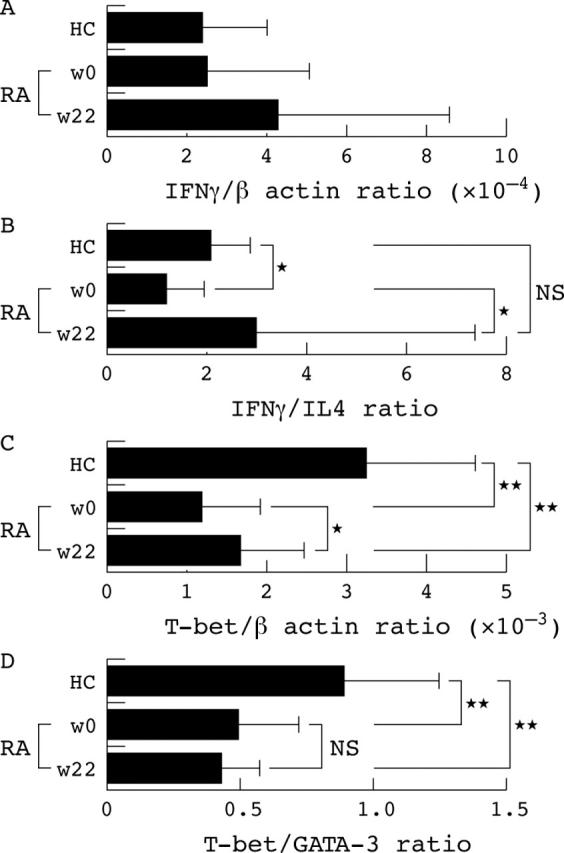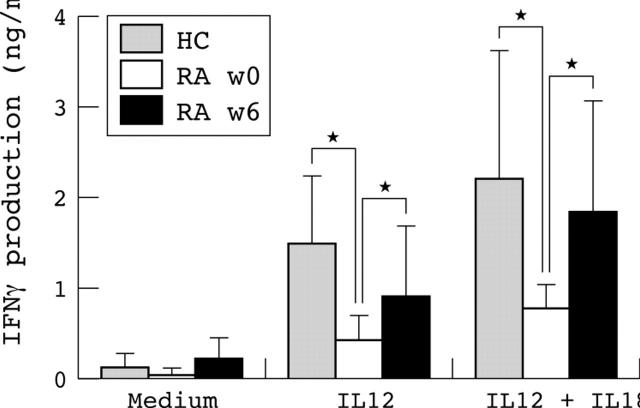Abstract
Objective: To study interferon γ (IFNγ) production and the expression of T-bet and GATA-3, the transcription factors associated with Th1 and Th2, in peripheral blood mononuclear cells (PBMC) from patients with rheumatoid arthritis before and during infliximab treatment, so as to distinguish between a disease specific and a disease activity dependent defect.
Methods: Rheumatoid PBMC were obtained at weeks 0 and 6 of infliximab treatment and cultured for seven days with or without interleukin (IL)12 or the combination of IL12 and IL18. IFNγ concentrations in supernatants were determined by ELISA. mRNA expression of IFNγ, IL4, T-bet, and GATA-3 was determined by real time RT-PCR in whole blood at weeks 0 and 22.
Results: A reduction in spontaneous IFNγ production and in the response to Th1 inducing cytokines occurred in rheumatoid PBMC. Reduction of systemic inflammation with infliximab treatment increased IFNγ production in response to IL12 or IL12+IL18. The IFNγ/IL4 expression ratio of rheumatoid blood before treatment was lower than in healthy controls but was increased by infliximab treatment. T-bet expression or T-bet/GATA-3 ratio of rheumatoid blood was less than in controls. The T-bet/GATA-3 ratio was not influenced by infliximab treatment.
Conclusions: Regulation of T-bet and GATA-3 or IFNγ and IL4 expression appeared different. The IFNγ/IL4 ratio might express the blood Th1/Th2 balance better than the T-bet/GATA-3 ratio. Reduced IFNγ production by rheumatoid PBMC and levels of IFNγ and IL4 mRNA expression in blood were linked to disease improvement, indicating an association between this systemic Th1 feature and disease activity.
Full Text
The Full Text of this article is available as a PDF (78.4 KB).
Figure 1.

Increased type 1 response in whole blood from patients with rheumatoid arthritis following anti-TNFα treatment. Whole blood samples were obtained from 12 healthy controls (HC) and from 15 patients with rheumatoid arthritis (RA) at week 0 (w0) and 22 (w22) of infliximab treatment. IFNγ, IL4, T-bet, GATA-3, and ß actin mRNA expression levels were determined by quantitative reverse transcriptase polymerase chain reaction. *p<0.05, **p<0.01
Figure 2.
Improvement in impaired interferon γ (IFNγ) production of peripheral blood mononuclear cells (PBMC) from patients with rheumatoid arthritis resulting from anti-tumour necrosis α (TNFα) treatment. PBMC from healthy controls (HC) (n = 6) and rheumatoid patients (RA) (n = 6) obtained at weeks 0 and 6 of infliximab treatment were cultured with or without interleukin (IL)12 (1 ng/ml) or IL12+IL18 (5 ng/ml) for seven days. IFNγ levels in the supernatants were determined by a specific sandwich enzyme linked immunosorbent assay. *p<0.05
Selected References
These references are in PubMed. This may not be the complete list of references from this article.
- Arnett F. C., Edworthy S. M., Bloch D. A., McShane D. J., Fries J. F., Cooper N. S., Healey L. A., Kaplan S. R., Liang M. H., Luthra H. S. The American Rheumatism Association 1987 revised criteria for the classification of rheumatoid arthritis. Arthritis Rheum. 1988 Mar;31(3):315–324. doi: 10.1002/art.1780310302. [DOI] [PubMed] [Google Scholar]
- Austrup F., Vestweber D., Borges E., Löhning M., Bräuer R., Herz U., Renz H., Hallmann R., Scheffold A., Radbruch A. P- and E-selectin mediate recruitment of T-helper-1 but not T-helper-2 cells into inflammed tissues. Nature. 1997 Jan 2;385(6611):81–83. doi: 10.1038/385081a0. [DOI] [PubMed] [Google Scholar]
- Carmona Loreto, Hernández-García César, Vadillo Cristina, Pato Esperanza, Balsa Alejandro, González-Alvaro Isidoro, Belmonte Miguel Angel, Tena Xavier, Sanmartí Raimon, EMECAR Study Group Increased risk of tuberculosis in patients with rheumatoid arthritis. J Rheumatol. 2003 Jul;30(7):1436–1439. [PubMed] [Google Scholar]
- Felson D. T., Anderson J. J., Boers M., Bombardier C., Furst D., Goldsmith C., Katz L. M., Lightfoot R., Jr, Paulus H., Strand V. American College of Rheumatology. Preliminary definition of improvement in rheumatoid arthritis. Arthritis Rheum. 1995 Jun;38(6):727–735. doi: 10.1002/art.1780380602. [DOI] [PubMed] [Google Scholar]
- Haddad A., Bienvenu J., Miossec P. Increased production of a Th2 cytokine profile by activated whole blood cells from rheumatoid arthritis patients. J Clin Immunol. 1998 Nov;18(6):399–403. doi: 10.1023/a:1023278606036. [DOI] [PubMed] [Google Scholar]
- Keane J., Gershon S., Wise R. P., Mirabile-Levens E., Kasznica J., Schwieterman W. D., Siegel J. N., Braun M. M. Tuberculosis associated with infliximab, a tumor necrosis factor alpha-neutralizing agent. N Engl J Med. 2001 Oct 11;345(15):1098–1104. doi: 10.1056/NEJMoa011110. [DOI] [PubMed] [Google Scholar]
- Krug A., Towarowski A., Britsch S., Rothenfusser S., Hornung V., Bals R., Giese T., Engelmann H., Endres S., Krieg A. M. Toll-like receptor expression reveals CpG DNA as a unique microbial stimulus for plasmacytoid dendritic cells which synergizes with CD40 ligand to induce high amounts of IL-12. Eur J Immunol. 2001 Oct;31(10):3026–3037. doi: 10.1002/1521-4141(2001010)31:10<3026::aid-immu3026>3.0.co;2-h. [DOI] [PubMed] [Google Scholar]
- Maurice M. M., van der Graaff W. L., Leow A., Breedveld F. C., van Lier R. A., Verweij C. L. Treatment with monoclonal anti-tumor necrosis factor alpha antibody results in an accumulation of Th1 CD4+ T cells in the peripheral blood of patients with rheumatoid arthritis. Arthritis Rheum. 1999 Oct;42(10):2166–2173. doi: 10.1002/1529-0131(199910)42:10<2166::AID-ANR18>3.0.CO;2-K. [DOI] [PubMed] [Google Scholar]
- Miossec P., van den Berg W. Th1/Th2 cytokine balance in arthritis. Arthritis Rheum. 1997 Dec;40(12):2105–2115. doi: 10.1002/art.1780401203. [DOI] [PubMed] [Google Scholar]
- Mohan V. P., Scanga C. A., Yu K., Scott H. M., Tanaka K. E., Tsang E., Tsai M. M., Flynn J. L., Chan J. Effects of tumor necrosis factor alpha on host immune response in chronic persistent tuberculosis: possible role for limiting pathology. Infect Immun. 2001 Mar;69(3):1847–1855. doi: 10.1128/IAI.69.3.1847-1855.2001. [DOI] [PMC free article] [PubMed] [Google Scholar]
- Morita Y., Yamamura M., Kawashima M., Harada S., Tsuji K., Shibuya K., Maruyama K., Makino H. Flow cytometric single-cell analysis of cytokine production by CD4+ T cells in synovial tissue and peripheral blood from patients with rheumatoid arthritis. Arthritis Rheum. 1998 Sep;41(9):1669–1676. doi: 10.1002/1529-0131(199809)41:9<1669::AID-ART19>3.0.CO;2-G. [DOI] [PubMed] [Google Scholar]
- Tak P. P., Taylor P. C., Breedveld F. C., Smeets T. J., Daha M. R., Kluin P. M., Meinders A. E., Maini R. N. Decrease in cellularity and expression of adhesion molecules by anti-tumor necrosis factor alpha monoclonal antibody treatment in patients with rheumatoid arthritis. Arthritis Rheum. 1996 Jul;39(7):1077–1081. doi: 10.1002/art.1780390702. [DOI] [PubMed] [Google Scholar]



